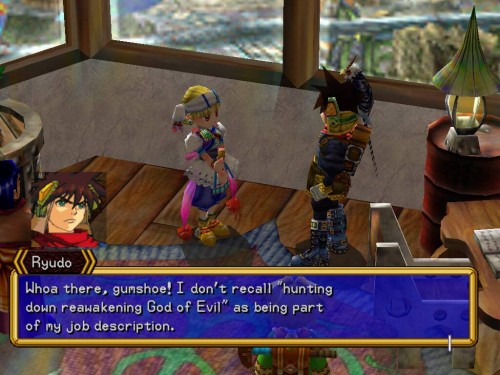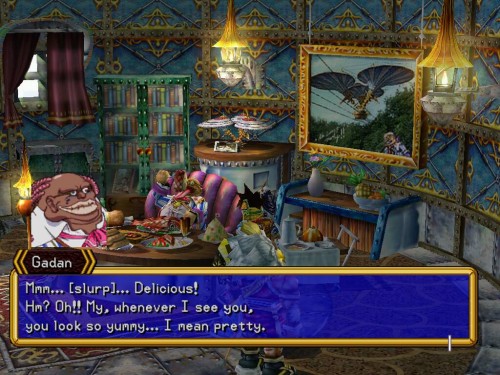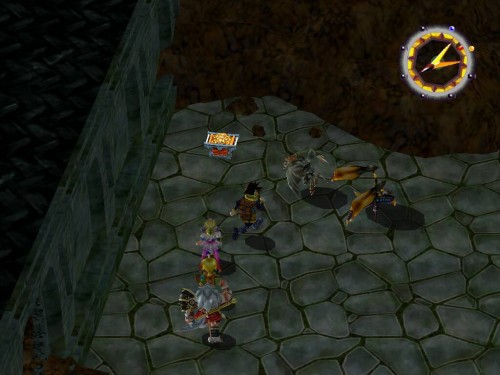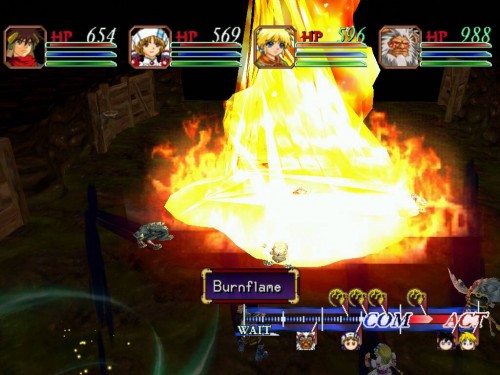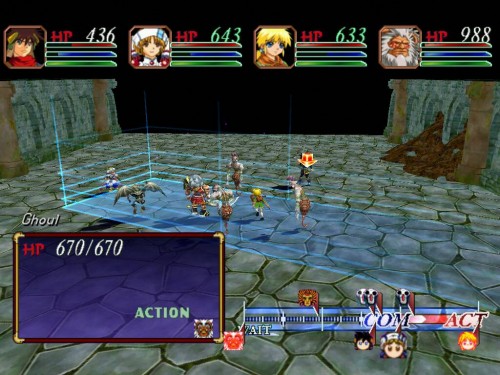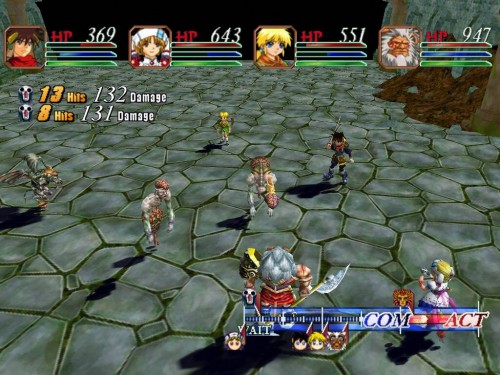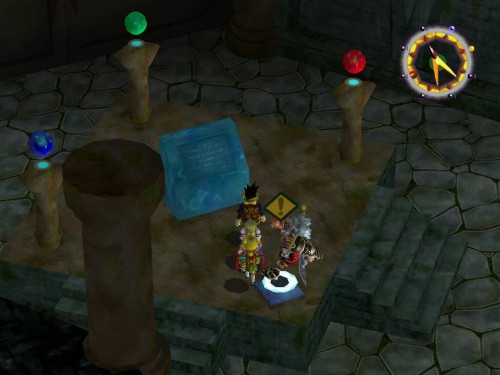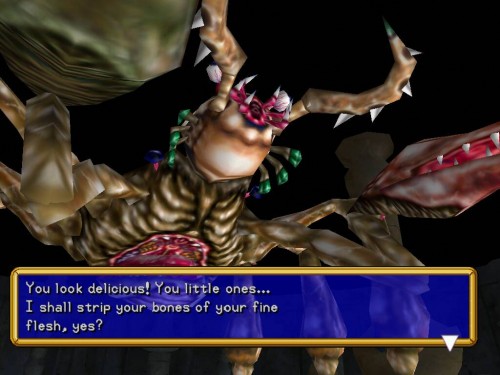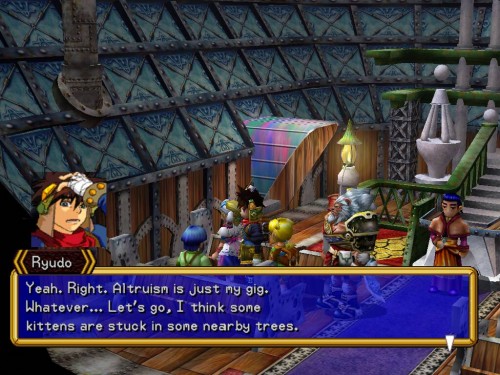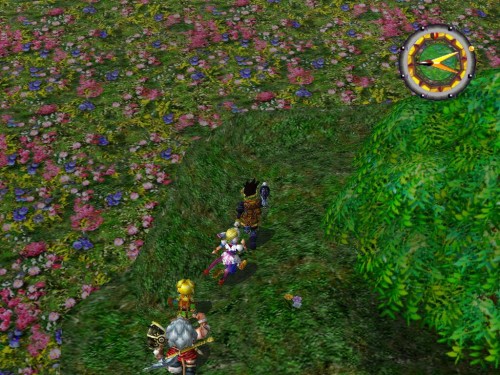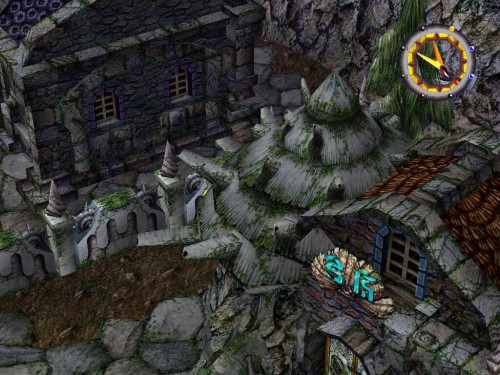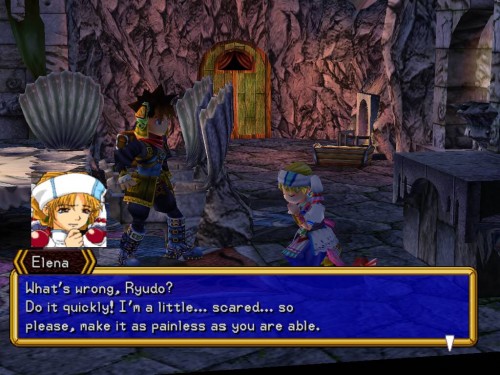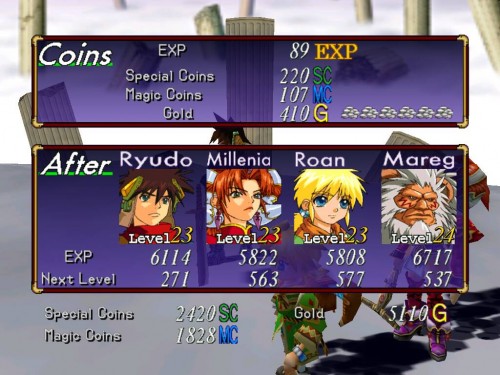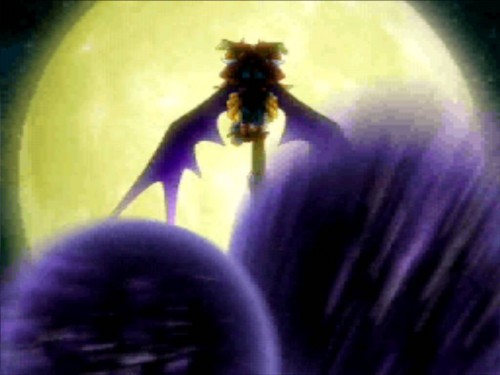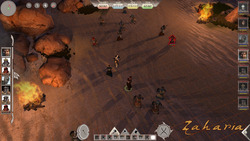Grandia II Review
Grandia II Review
Codex Review - posted by Xerophyte on Wed 23 October 2002, 19:12:45
Tags: Game Arts; Grandia IIUndaunted by Calis' screwy code replacing the previous version with another instance of Deathy's Great Quest Article, Xerophyte re-uploads his review. Will the upload be a success? Or will the article once again fall prey to the foul bugs roaming the system?
Stay tuned to find out!
Stay tuned to find out!
The Game Arts executives did say: let console role playing come to the PC
Console-styled RPGs aren't exactly common on the PC. Sure, we get the odd Final Fantasy port and the occasional native game like Anachronox or Septerra Core, but hardly the selection our gamepadedly gifted brethren with Playstations are blessed with. I, unlike most everyone else working on this site, find this to be far too little. I like these linear, childish creations a great deal and it was with no small amount of expectation that I bought the PC port of Grandia II, developed by the veterans of Game Arts and supposedly one of the best games for the Dreamcast and one of the best console RPGs in recent memory.
Opening the box revealed very little of note - the generic-yet-adequate DVD case contained a generic-yet-adequate manual and two discs, one for installation and one for playing. Foregoing such pleasantries as reading the manual I threw myself into the game - it's been 30 hours of playtime since then, I've completed my quests and my expectations have been met in some ways and missed in others. On one hand, Grandia II is a very well polished game that's very fun to play and certainly every bit the console RPG. On the other hand, it suffers from some rather jarring artefacts from its console roots and there are parts of the game that fail utterly to live up the polish found elsewhere. But I'm getting ahead of myself. First things first, and the first thing you note about a game is the graphics.
Let all things be coloured some gaily pastel-ish colour . . .
Most of Grandia II has that typically cartoon-like bright-and-happy look, with grass being the greenest of green, forests lushest of lush and cities just generally happy and idyllic. There are notable exceptions to this pattern, including a very well designed mountain village, complete with a dream sequence taken from Salvador Dali's worst nightmares, and some more dark and disturbing locales of the later parts of the game - but things mostly look like they were designed for abject cuteness.
The characters all follow the stereotypical idea of an anime character: big eyes, no mouth, no nose and tastes in clothing that range from the impractical to the insane. The animation suffers from some "skating" when some models move but is overall well done, especially during battles. The static maps are a little less consistent in quality, but overall good; the towns and building often look wondrous, with vibrant colours and distinct architecture. A great cathedral one gets to visit stands out as an exceptionally realised piece of work and the standard is generally high. Strangely and sadly the many wilderness areas and caverns are much less inspired, looking repetitive and bland though still competently made. The largest problem with any of the 3D areas is that some of the textures that are required to fill larger areas, such as the ground or any above-the-horizon background, suffer from not being touched up when being converted from console and can be annoyingly blurry and/or repetitive.
But the 3D artwork usually presents a nice, vibrant look. No, what really hurts the eyes in Grandia II is the occasional attempt to immerse us in the game via video sequences. Ubisoft, in their sage wisdom, decided to keep these in the same blurry, blocky versions used on the Dreamcast version. Not pretty. Not pretty at all. Even more saddening is the fact that blurry movies are used to represent some of the more frequently spell effects in combat, which just makes my eyes bleed and my heart tremble with anger. Especially since the 3D-based spell effects are quite pretty and joyously over-the-top; as one might expect from spells with names like "BA-BOOM!" and what not, but I digress.
. . . and let all sound be like the cheeriest nightmares you've ever had
While the graphics were only painful infrequently, the same can not be said of the sound effects. Granted, most of them aren't that bad. General combat slashing and fighting sounds fair enough and the generic techno/rock/ambient music is fitting, if sometimes bland. There are, however, some things in the sound department that take effort to phase out in order to preserve one's sanity. First and possibly foremost are the sounds of footsteps. Regardless of surface trot, they sound nothing like footfalls. Just dull thuds that make me wonder if the characters might've all been in horrible accidents and been forced to amputate their feet in favour of wooden ones. I feel blessed whenever my party got to walk on carpet, so I don't have to hear them injure the floors quite that loudly. The other ambient sounds of the game are difficult to comment on, seeing as how there are none. Only your party's footsteps can be heard (which is a mercy, I guess) and there seems to be no wildlife with vocal capabilities anywhere in the game world.
Perhaps worse then the footfalls, however, are the voiceovers. The main character is fair, rather exaggerated like all the other voices but it's the same actor who portrayed Leonardo's voice in the Turtles cartoon and I'm prepared to forgive him if just for that. Some of the others characters, however . . . ick. Imagine, if you will, someone saying lines such as "Please wind, dance!" and, "Here goes my impact bomb" while attempting to sound like a girl of 14 suffering from constipation and only succeeding partly. It's not a treat for the ears, I promise.
Fortunately, most of the sound effects and voice acting is suitably ignorable and doesn't detract quite as much as I might make it sound, but suffice to say that Grandia II does not rank high in the aural department and infrequently even makes you want to fly over and maim certain Japanese sound engineers.
Let all characters be fairly typical, . . .
Enough on superficial things, it's time we got to the meat of any console RPG setting, story and characters. The player takes on the role of Ryudo, an introverted, wisecracking and spiky-haired Geohound (mercenary, with cool and hip alternate name) whom we first meet as he is given the task of guarding the kind and gentle Elena, a Songstress of the equally kind and gentle god Granas, while she performs a Rite of Sealing in a nearby tower of disturbing architecture. Ryudo is the generic sardonic hero type, with oversized sword, cynical attitude and a horrible secret lurking in his past. Elena is the typical kind little girl, a nauseatingly cute being who always thinks the best of everyone and wears what's probably the least practical traveling outfit I have ever seen in my life.
The two are later joined on their travels by a fiery magicienne, a feral beast-man, an innocent young boy and an android learning emotions. All proud set pieces in the history of console RPG characters. None, with the possible exception of Mareg the philosophical Beast-man, have a personality that takes longer than 2 lines of text to understand and most of the personal developments our happy crew go through are of the utterly predictable kind. That being said, there's still some very good material here. Game Arts have done a wonderful job on character interaction, making the party banter endearing and often even witty in spite of the rather simple characters. There's even a system for having conversations over dinner whenever you stop at an inn - certainly not the most essential feature ever, but small touches like it add a great deal of colour to what would otherwise be mostly plain characters.
. . let our world be a detailed line . . .
The world is explored in what's more or less standard fashion for the genre: you arrive at Town A, meet with the obviously important person and are told what to do next in a non-interactive bit of dialogue. After completing the task, usually accomplished by beating at horrible monsters with whatever implements of destruction are currently at your disposal, you get treated to another non-interactive scene and can suddenly access the previously closed path to Town B. You can walk around the various towns and talk to the less important people living there to flesh out the setting, but this usually has little or no impact on the game in general. There is really no free form exploration of the world, the "field maps" you can visit are limited and designated by the game and there's no freely walking about the world whatsoever.
This linearity isn't all a bad thing. The good souls of Game Arts have used the time and effort they spared on linearity to add much personality to their game world with great attention to detail and a great many personal touches. There are oodles of unimportant mini-tasks and bits of information from above mentioned less important people, all the intra-party banter and plenty of ironic remarks on how corny the entire story really is, all of which goes a long way to making the game world a great deal more interesting than one might think. The towns all breathe personality, both in design and in the people inhabiting them, and no place feels uninteresting or bland. Sure, they too are mostly cliches, like the city of engineers, the great city of religion, the village of the primitive Beast-men and such, but they're well made cliches with interesting cliche people living in them
. . . and let all plot be predictable, childish and surprisingly amusing.
The main plot itself is really a rather childish one, even by genre standards. The characters are all adolescents and act the part - their lack of perceptiveness sometimes makes you want to scream as things must be laid out in the most obvious manner possible for them to understand what you puzzled together a few hours ago. The plot is permeated with embarrassingly cute things, like speeches on the power of a believing heart, deep despair of the masses being cured by a girl's singing and similar sentimentality that makes me wonder if my intelligence is being questioned. All the major foes the party faces are Really, Really Bad People and scream incoherent things at you that mostly boil down to "You can't ever defeat me, for I am The Really Bad Guy." There are some nicely darker elements to pass through in the story, but even these revolve around rather cute things like the little girl who has inherited the powers of a dark god and tries to use them to bring happiness to the people of her village, yet almost manages to cause their death instead.
Even though the plot really has all the elements necessary for not being liked, I actually liked seeing it develop quite a bit. The writing is surprisingly good, even if the actual meaning of it isn't, and the translators have done an overall excellent job on keeping it free of Japanese influence. The fact that the game doesn't take itself very seriously and frequently pokes fun at all the stereotypes it flings at you really only improves things. It's my predictably quirky group of adventurers against the raging hordes of great evil, here to save a world of people in need with the strength of their friendship and might of their weaponry and spellcraft. All horribly cliche, yes, but uncomplicated and a very fun way of distracting oneself for a number hours; at least for childish people like me. And having fun is the main point of playing games, after all.
Let all fights be of wondrous joy . . .
When you're not in towns to advance the plot, you're usually in the monster-riddled labyrinthine wilderness between them or the monster-riddled labyrinthine caverns beneath them, picking up the piles of gold and other objects of looting left behind by unknown benefactors. The monsters riddling the areas in question are wondering around visible on the map and not randomly encountered as in the Final Fantasy games. Once you walk into a group of little monsters walking about the field, you're transported to a special battle view, where the actual fighting will take place.
Whereas fighting often becomes tedious and boring in other console RPGs, things are not so here. Combat is where Grandia II shines; the battle system is pure joy to use. When your heroes encounter enemies while walking about the world they are whisked away to take up position on a battle screen where the actual fighting takes place. Your characters have a meter that must be filled up before they may act. When a character reaches a point marked COM on the meter the game pauses and you get to issue a command and must then wait a few seconds, varying depending on the command selected, for the character to reach the ACT point at which he does whatever you told him. When a character is being hit his meter stops increasing for a time and if he is hit with certain attacks between being issued a command and actually applying it his action will be cancelled and he'll loose his turn. Now, this might sound uninteresting enough on paper but in practice the system transforms the often repetitive antics of console RPG battles into an intense match of timing and concentration as you struggle to select the optimum attacks; considering distance, abilities and equipment in order to time the perfect battle plan. It has a great deal more fluid feel, with characters and enemies running to and fro, maiming each other gleefully and is actually surprisingly tactical. You feel a great deal of pride when all your gambles pay off and your chosen strategy lets you get through what seemed a difficult battle with nary a scratch.
Which brings us to the slight problem in the Grandia II battle system - difficulty. Because there really isn't any difficulty to be found. Only once while playing through the game did I lose a fight and that was in a particularly difficult optional area in the later parts of the game. Other than that one battle I never even once had a party member fall, much less lost and was forced to reload. It's to the games credit that I felt threatened every now and then and actually had to work for many of my victories, but some more work wouldn't have been all wrong. Of course, this perceived lack of challenge might be because I am a Grandia II player of divine skill and expertise, gifted with superhuman dexterity and an uncanny sense of tactical finesse . . . but I doubt it. The fights are certainly fun, regardless of the lacking difficulty.
. . . and let all their rewards be useful
Character advancement is another aspect handled well and offers more control over the progression and abilities of your characters than is common in the genre. After suitably smiting their foes (foe-smiting being the only way to advance here) your characters are given experience points for an overall rise in efficiency, gold for buying items and finally special coins and magic coins. These are used to "buy" specific abilities for your characters. The special coins are used to buy and improve character-specific battle skills and to buy attribute increases for physical combat and the magic coins are used to buy spells and attribute increases for magical combat.
The magic is tied to certain "Mana Eggs" and the attribute increases to "Skill Books", these can be given to whomever you want. If you want to change who is currently in the role of party healer you can give the "Holy Egg" with all the healing magic to some other character and if you want to change who has the Move attribute increase, you can "equip" that on another character as well. It's a bit strange to be able to switch the roles assigned to your characters almost entirely, but it does allow for power and flexibility in designing your party and complements the tactical elements of combat very well.
Finally, let us retain some console leftovers and write some bugs into our code . . .
There was a number of smaller quirks and bugs that impaired my enjoyment of the game, some related to its console roots and some that were plain bugs. The control and menu systems are all the same as on the console version of the game. Text is generally larger than it has to be on a PC and every aspect of the design screams for being played with a gamepad. If you don't have one of those you're going to use your keyboard, for there's no mouse support to be found. Ubisoft have also not bothered to include such PC standards like in-game control of resolution, volume and key bindings or even the ability to exit the game via the in-game menus.
On the bug side there were some more issues. The music would stop playing in certain areas of a map, the screen would just seem to freeze during some spell effects and early on I hit a crippling bug that killed my character and forced me to revert to a saved game. I also encountered one inexplicable crash and at two times I started getting odd error messages before each combat and had to restart. The bugs I"ve encountered are at least few enough to list in the review, which is better than many games nowadays, but they're hardly a good thing.
. . . and then let all be wrapped up
If it's not obvious from my frequent use of the word up to now, let me reiterate. Grandia II is a very cliche game. The world, characters, story and graphics are cliches. The text on the back of the box is cliche. The main characters hair is cliche. It's unabashedly childish, often silly and usually predictable. But it's a very well-made game, with pretty graphics to ogle, some lovably corny dialogue to read and a people you actually start to care about to rescue. Above all issues with sound, conversion from console and such stands the fact that Grandia II is just plain fun.
You probably have to be somewhat childish to appreciate it, it's certainly not the most mature of games, and you'd better not be expecting anything but a typical console-styled RPG. But given that, Grandia II is a very amusing distraction from day-to-day toil with cute girls in distress, evil gods on the rampage and cynical teenagers with overdimensioned swords saving the world from certain destruction. What more can you ask for?
Console-styled RPGs aren't exactly common on the PC. Sure, we get the odd Final Fantasy port and the occasional native game like Anachronox or Septerra Core, but hardly the selection our gamepadedly gifted brethren with Playstations are blessed with. I, unlike most everyone else working on this site, find this to be far too little. I like these linear, childish creations a great deal and it was with no small amount of expectation that I bought the PC port of Grandia II, developed by the veterans of Game Arts and supposedly one of the best games for the Dreamcast and one of the best console RPGs in recent memory.
Opening the box revealed very little of note - the generic-yet-adequate DVD case contained a generic-yet-adequate manual and two discs, one for installation and one for playing. Foregoing such pleasantries as reading the manual I threw myself into the game - it's been 30 hours of playtime since then, I've completed my quests and my expectations have been met in some ways and missed in others. On one hand, Grandia II is a very well polished game that's very fun to play and certainly every bit the console RPG. On the other hand, it suffers from some rather jarring artefacts from its console roots and there are parts of the game that fail utterly to live up the polish found elsewhere. But I'm getting ahead of myself. First things first, and the first thing you note about a game is the graphics.
Let all things be coloured some gaily pastel-ish colour . . .
Most of Grandia II has that typically cartoon-like bright-and-happy look, with grass being the greenest of green, forests lushest of lush and cities just generally happy and idyllic. There are notable exceptions to this pattern, including a very well designed mountain village, complete with a dream sequence taken from Salvador Dali's worst nightmares, and some more dark and disturbing locales of the later parts of the game - but things mostly look like they were designed for abject cuteness.
The characters all follow the stereotypical idea of an anime character: big eyes, no mouth, no nose and tastes in clothing that range from the impractical to the insane. The animation suffers from some "skating" when some models move but is overall well done, especially during battles. The static maps are a little less consistent in quality, but overall good; the towns and building often look wondrous, with vibrant colours and distinct architecture. A great cathedral one gets to visit stands out as an exceptionally realised piece of work and the standard is generally high. Strangely and sadly the many wilderness areas and caverns are much less inspired, looking repetitive and bland though still competently made. The largest problem with any of the 3D areas is that some of the textures that are required to fill larger areas, such as the ground or any above-the-horizon background, suffer from not being touched up when being converted from console and can be annoyingly blurry and/or repetitive.
But the 3D artwork usually presents a nice, vibrant look. No, what really hurts the eyes in Grandia II is the occasional attempt to immerse us in the game via video sequences. Ubisoft, in their sage wisdom, decided to keep these in the same blurry, blocky versions used on the Dreamcast version. Not pretty. Not pretty at all. Even more saddening is the fact that blurry movies are used to represent some of the more frequently spell effects in combat, which just makes my eyes bleed and my heart tremble with anger. Especially since the 3D-based spell effects are quite pretty and joyously over-the-top; as one might expect from spells with names like "BA-BOOM!" and what not, but I digress.
. . . and let all sound be like the cheeriest nightmares you've ever had
While the graphics were only painful infrequently, the same can not be said of the sound effects. Granted, most of them aren't that bad. General combat slashing and fighting sounds fair enough and the generic techno/rock/ambient music is fitting, if sometimes bland. There are, however, some things in the sound department that take effort to phase out in order to preserve one's sanity. First and possibly foremost are the sounds of footsteps. Regardless of surface trot, they sound nothing like footfalls. Just dull thuds that make me wonder if the characters might've all been in horrible accidents and been forced to amputate their feet in favour of wooden ones. I feel blessed whenever my party got to walk on carpet, so I don't have to hear them injure the floors quite that loudly. The other ambient sounds of the game are difficult to comment on, seeing as how there are none. Only your party's footsteps can be heard (which is a mercy, I guess) and there seems to be no wildlife with vocal capabilities anywhere in the game world.
Perhaps worse then the footfalls, however, are the voiceovers. The main character is fair, rather exaggerated like all the other voices but it's the same actor who portrayed Leonardo's voice in the Turtles cartoon and I'm prepared to forgive him if just for that. Some of the others characters, however . . . ick. Imagine, if you will, someone saying lines such as "Please wind, dance!" and, "Here goes my impact bomb" while attempting to sound like a girl of 14 suffering from constipation and only succeeding partly. It's not a treat for the ears, I promise.
Fortunately, most of the sound effects and voice acting is suitably ignorable and doesn't detract quite as much as I might make it sound, but suffice to say that Grandia II does not rank high in the aural department and infrequently even makes you want to fly over and maim certain Japanese sound engineers.
Let all characters be fairly typical, . . .
Enough on superficial things, it's time we got to the meat of any console RPG setting, story and characters. The player takes on the role of Ryudo, an introverted, wisecracking and spiky-haired Geohound (mercenary, with cool and hip alternate name) whom we first meet as he is given the task of guarding the kind and gentle Elena, a Songstress of the equally kind and gentle god Granas, while she performs a Rite of Sealing in a nearby tower of disturbing architecture. Ryudo is the generic sardonic hero type, with oversized sword, cynical attitude and a horrible secret lurking in his past. Elena is the typical kind little girl, a nauseatingly cute being who always thinks the best of everyone and wears what's probably the least practical traveling outfit I have ever seen in my life.
The two are later joined on their travels by a fiery magicienne, a feral beast-man, an innocent young boy and an android learning emotions. All proud set pieces in the history of console RPG characters. None, with the possible exception of Mareg the philosophical Beast-man, have a personality that takes longer than 2 lines of text to understand and most of the personal developments our happy crew go through are of the utterly predictable kind. That being said, there's still some very good material here. Game Arts have done a wonderful job on character interaction, making the party banter endearing and often even witty in spite of the rather simple characters. There's even a system for having conversations over dinner whenever you stop at an inn - certainly not the most essential feature ever, but small touches like it add a great deal of colour to what would otherwise be mostly plain characters.
. . let our world be a detailed line . . .
The world is explored in what's more or less standard fashion for the genre: you arrive at Town A, meet with the obviously important person and are told what to do next in a non-interactive bit of dialogue. After completing the task, usually accomplished by beating at horrible monsters with whatever implements of destruction are currently at your disposal, you get treated to another non-interactive scene and can suddenly access the previously closed path to Town B. You can walk around the various towns and talk to the less important people living there to flesh out the setting, but this usually has little or no impact on the game in general. There is really no free form exploration of the world, the "field maps" you can visit are limited and designated by the game and there's no freely walking about the world whatsoever.
This linearity isn't all a bad thing. The good souls of Game Arts have used the time and effort they spared on linearity to add much personality to their game world with great attention to detail and a great many personal touches. There are oodles of unimportant mini-tasks and bits of information from above mentioned less important people, all the intra-party banter and plenty of ironic remarks on how corny the entire story really is, all of which goes a long way to making the game world a great deal more interesting than one might think. The towns all breathe personality, both in design and in the people inhabiting them, and no place feels uninteresting or bland. Sure, they too are mostly cliches, like the city of engineers, the great city of religion, the village of the primitive Beast-men and such, but they're well made cliches with interesting cliche people living in them
. . . and let all plot be predictable, childish and surprisingly amusing.
The main plot itself is really a rather childish one, even by genre standards. The characters are all adolescents and act the part - their lack of perceptiveness sometimes makes you want to scream as things must be laid out in the most obvious manner possible for them to understand what you puzzled together a few hours ago. The plot is permeated with embarrassingly cute things, like speeches on the power of a believing heart, deep despair of the masses being cured by a girl's singing and similar sentimentality that makes me wonder if my intelligence is being questioned. All the major foes the party faces are Really, Really Bad People and scream incoherent things at you that mostly boil down to "You can't ever defeat me, for I am The Really Bad Guy." There are some nicely darker elements to pass through in the story, but even these revolve around rather cute things like the little girl who has inherited the powers of a dark god and tries to use them to bring happiness to the people of her village, yet almost manages to cause their death instead.
Even though the plot really has all the elements necessary for not being liked, I actually liked seeing it develop quite a bit. The writing is surprisingly good, even if the actual meaning of it isn't, and the translators have done an overall excellent job on keeping it free of Japanese influence. The fact that the game doesn't take itself very seriously and frequently pokes fun at all the stereotypes it flings at you really only improves things. It's my predictably quirky group of adventurers against the raging hordes of great evil, here to save a world of people in need with the strength of their friendship and might of their weaponry and spellcraft. All horribly cliche, yes, but uncomplicated and a very fun way of distracting oneself for a number hours; at least for childish people like me. And having fun is the main point of playing games, after all.
Let all fights be of wondrous joy . . .
When you're not in towns to advance the plot, you're usually in the monster-riddled labyrinthine wilderness between them or the monster-riddled labyrinthine caverns beneath them, picking up the piles of gold and other objects of looting left behind by unknown benefactors. The monsters riddling the areas in question are wondering around visible on the map and not randomly encountered as in the Final Fantasy games. Once you walk into a group of little monsters walking about the field, you're transported to a special battle view, where the actual fighting will take place.
Whereas fighting often becomes tedious and boring in other console RPGs, things are not so here. Combat is where Grandia II shines; the battle system is pure joy to use. When your heroes encounter enemies while walking about the world they are whisked away to take up position on a battle screen where the actual fighting takes place. Your characters have a meter that must be filled up before they may act. When a character reaches a point marked COM on the meter the game pauses and you get to issue a command and must then wait a few seconds, varying depending on the command selected, for the character to reach the ACT point at which he does whatever you told him. When a character is being hit his meter stops increasing for a time and if he is hit with certain attacks between being issued a command and actually applying it his action will be cancelled and he'll loose his turn. Now, this might sound uninteresting enough on paper but in practice the system transforms the often repetitive antics of console RPG battles into an intense match of timing and concentration as you struggle to select the optimum attacks; considering distance, abilities and equipment in order to time the perfect battle plan. It has a great deal more fluid feel, with characters and enemies running to and fro, maiming each other gleefully and is actually surprisingly tactical. You feel a great deal of pride when all your gambles pay off and your chosen strategy lets you get through what seemed a difficult battle with nary a scratch.
Which brings us to the slight problem in the Grandia II battle system - difficulty. Because there really isn't any difficulty to be found. Only once while playing through the game did I lose a fight and that was in a particularly difficult optional area in the later parts of the game. Other than that one battle I never even once had a party member fall, much less lost and was forced to reload. It's to the games credit that I felt threatened every now and then and actually had to work for many of my victories, but some more work wouldn't have been all wrong. Of course, this perceived lack of challenge might be because I am a Grandia II player of divine skill and expertise, gifted with superhuman dexterity and an uncanny sense of tactical finesse . . . but I doubt it. The fights are certainly fun, regardless of the lacking difficulty.
. . . and let all their rewards be useful
Character advancement is another aspect handled well and offers more control over the progression and abilities of your characters than is common in the genre. After suitably smiting their foes (foe-smiting being the only way to advance here) your characters are given experience points for an overall rise in efficiency, gold for buying items and finally special coins and magic coins. These are used to "buy" specific abilities for your characters. The special coins are used to buy and improve character-specific battle skills and to buy attribute increases for physical combat and the magic coins are used to buy spells and attribute increases for magical combat.
The magic is tied to certain "Mana Eggs" and the attribute increases to "Skill Books", these can be given to whomever you want. If you want to change who is currently in the role of party healer you can give the "Holy Egg" with all the healing magic to some other character and if you want to change who has the Move attribute increase, you can "equip" that on another character as well. It's a bit strange to be able to switch the roles assigned to your characters almost entirely, but it does allow for power and flexibility in designing your party and complements the tactical elements of combat very well.
Finally, let us retain some console leftovers and write some bugs into our code . . .
There was a number of smaller quirks and bugs that impaired my enjoyment of the game, some related to its console roots and some that were plain bugs. The control and menu systems are all the same as on the console version of the game. Text is generally larger than it has to be on a PC and every aspect of the design screams for being played with a gamepad. If you don't have one of those you're going to use your keyboard, for there's no mouse support to be found. Ubisoft have also not bothered to include such PC standards like in-game control of resolution, volume and key bindings or even the ability to exit the game via the in-game menus.
On the bug side there were some more issues. The music would stop playing in certain areas of a map, the screen would just seem to freeze during some spell effects and early on I hit a crippling bug that killed my character and forced me to revert to a saved game. I also encountered one inexplicable crash and at two times I started getting odd error messages before each combat and had to restart. The bugs I"ve encountered are at least few enough to list in the review, which is better than many games nowadays, but they're hardly a good thing.
. . . and then let all be wrapped up
If it's not obvious from my frequent use of the word up to now, let me reiterate. Grandia II is a very cliche game. The world, characters, story and graphics are cliches. The text on the back of the box is cliche. The main characters hair is cliche. It's unabashedly childish, often silly and usually predictable. But it's a very well-made game, with pretty graphics to ogle, some lovably corny dialogue to read and a people you actually start to care about to rescue. Above all issues with sound, conversion from console and such stands the fact that Grandia II is just plain fun.
You probably have to be somewhat childish to appreciate it, it's certainly not the most mature of games, and you'd better not be expecting anything but a typical console-styled RPG. But given that, Grandia II is a very amusing distraction from day-to-day toil with cute girls in distress, evil gods on the rampage and cynical teenagers with overdimensioned swords saving the world from certain destruction. What more can you ask for?





